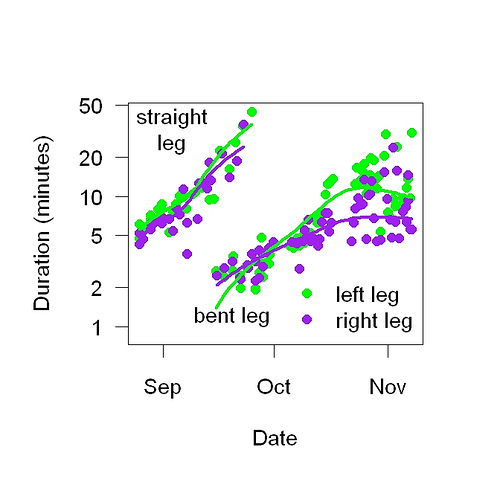The story so far. Standing on one foot till exhaustion twice during the day vastly improved my sleep that night. I slept longer and, especially, woke up much more rested.
Theory. I have a theory about what’s going on. When muscles are stressed — used until some of the muscle fibers break — two things happen: 1. More muscle fibers grow (= you become stronger). Everyone knows this. 2. A chemical is released by the muscle that travels to the brain and increases depth of sleep. This is a new idea. The big picture is that sleep is controlled by many things; this is one of them. Morning light is also important but that is pretty obvious, at least to sleep researchers. Morning light appears to control both the timing and depth of sleep. These muscle-produced hormones appear to mainly affect depth of sleep; I don’t notice any change in when I sleep. The evolutionary rationale is plain: We grow muscles better when we’re asleep. If we need to grow muscles more than usual, we need more sleep than usual.
New data. I want to understand what the effect depends on. What makes it weaker or stronger — especially stronger? As my legs grew stronger, the effect became slightly weaker, presumably because it was harder to produce new muscle growth in a practical amount of time. My main measure of the effect is how rested I feel when I awake. I assess that on a 0-100 scale where 0 = just as tired as when I fell asleep and 100 = completely free from tiredness. I reached scores of 100 years ago when I was on my feet for 9 or 10 hours during the day and once or twice on camping trips. Standing that much is impractical so 100 appeared impossible to reach regularly. In Berkeley, during the months before I discovered this effect, this score averaged about 95. After discovery of this effect, it was usually 99 — a big easy-to-notice improvement.
But 99 was impossible to maintain because as my legs got stronger it started to take a really long time to exhaust them. I shifted to standing on one bent leg. This obviously reduced how long I needed to stand to produce exhaustion but it was less effective (presumably because fewer muscles were involved). When I shifted from standing one-legged however I wanted (two bouts/day) to standing with the leg bent most or all of the time (four bouts/day), the scores went down to 98 or 97. After a week or so of bent-leg standing I started using the cycle 50 seconds bent, 10 seconds straight; I repeated this as long as I could.
Here is a graph showing how long I stood.

The interesting point is that the strength increase finally levelled off at a bearable amount of time, yet the effect has persisted. If I spend about 8 minutes 4 times a day watching TV or a movie (and standing on one bent leg at the same time) I can substantially improve my sleep. This is practical. It’s the easiest exercise I’ve ever done. No special equipment. Watch TV at the same time. Big benefit. I’ve tried other muscle-building exercises, including push-ups done two different ways, jump-roping, and something vaguely resembling a biceps curl done with a thick rubber band. None has had a detectable effect. For example, after a day with jump-roping and two bouts of one-legged standing, I sleep about as well as after a day with just two bouts of one-legged standing.
Can I say again how wonderful it is to wake up totally rested? It seems almost within my grasp.
Previous posts about this.
